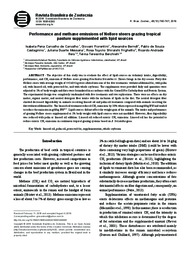Performance and methane emissions of Nellore steers grazing tropical pasture supplemented with lipid sources.
Performance and methane emissions of Nellore steers grazing tropical pasture supplemented with lipid sources.
Author(s): CARVALHO, I. P. C. de; FIORENTINI, G.; BERNDT, A.; CASTAGNINO, P. S.; MESSANA, J. D.; FRIGHETTO, R. T. S.; REIS, R. A.; BERCHIELLI, T. T.
Summary: Abstract: The objective of this study was to evaluate the effect of lipid sources on voluntary intake, digestibility, performance, and CH4 emission of Nellore steers grazing Brachiaria brizantha cv. Xaraés forage in the dry season. Forty-five Nellore steers with average weight of 442±34 kg were alloted into one of the five treatments: without additional fat; with palm oil; with linseed oil; with protected fat; and with whole soybeans. The supplements were provided daily and quantities were adjusted to 1% of body weight and diets were formulated in accordance with the Cornell Net Carbohydrate and Protein System. The experimental design was completely randomized with five treatments and two replications. There were no effects on dry matter, organic matter, and neutral detergent fiber intake with the inclusion of lipids in the diet. The neutral detergent fiber showed decreased digestibility in animals receiving linseed oil and palm oil treatments compared with animals receiving the diet without additional fat. The linseed oil treatment reduced CH4 emissions by 38% when expressed in mg/d/kg BW and tended to reduce the emission in g/d/kg BW0.75. Lipid sources did not affect the weight gain of the animals. The intake and performance of grazing Nellore steers supplemented at 1% body weight with lipid sources were not modified. However, fiber digestibility was reduced with palm or linseed oil addition. Linseed oil reduced enteric CH4 emissions. Linseed oil has the potential to reduce enteric CH4 emissions in continuous tropical grazing systems based on B. brizantha grass.
Publication year: 2016
Types of publication: Journal article
Unit: Embrapa Environment
Observation
Some of Embrapa's publications are published as ePub files. To read them, use or download one of the following free software options to your computer or mobile device. Android: Google Play Books; IOS: iBooks; Windows and Linux: Calibre.
Access other publications
Access the Agricultural Research Database (BDPA) to consult Embrapa's full library collection and records.
Visit Embrapa Bookstore to purchase books and other publications sold by Embrapa.

